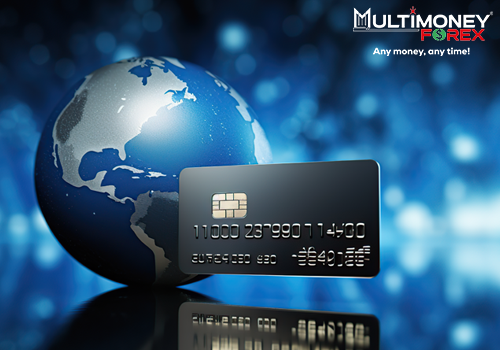Traveling to another country is exciting, but you also need to think about how to manage your money. A big question for travelers is how to carry and spend money safely and easily while abroad. Two common choices are forex cards and international wallet apps. But which one is better for you?
What Is a Forex Card?
A Forex card (foreign exchange card) is a prepaid travel card that you can load with one or more foreign currencies before your trip. Issued by banks or financial institutions, these cards are designed for international travel and allow you to spend or withdraw money in foreign currency without worrying about currency fluctuation (if loaded in advance).
What Is an International Wallet App?
International wallet apps like Revolut, Wise (formerly TransferWise), PayPal, and Niyo Global are digital wallets that let you hold, convert, and spend money in multiple currencies. Linked to a physical or virtual card, these apps offer real-time exchange rates and can be used for online transactions, international payments, and ATM withdrawals.
Forex Card vs International Wallet App: Feature Comparison
Key differences to help you decide.
1. Currency Exchange Rates
- Forex Card:
Offers a locked-in rate at the time of loading. You are shielded from currency fluctuations during your trip, which is a plus if the currency is expected to rise. - Wallet App:
Gives you live market exchange rates. You get the best rate at the moment of the transaction, but are exposed to market volatility.
2. Currency Support
- Forex Card:
Typically supports a limited number of currencies (5 to 20). You need to pre-load the exact currency. - Wallet App:
Supports 30–50+ currencies. Funds are automatically converted at the best rate if you don’t have the local currency.
3. Usability & Acceptance
- Forex Card:
Widely accepted at ATMs and point-of-sale machines internationally. Not suitable for online payments or app subscriptions. - Wallet App:
Works online and offline. Ideal for online shopping, booking hotels, and even subscribing to international services.
4. Fees & Charges
- Forex Card:
May charge: - Card issuance fee
- ATM withdrawal fee
- Inactivity fee
- Reload fee
- Cross-currency usage fee (if used in an unsupported currency)
- Wallet App:
Often zero or minimal fees on loading, but may charge: - Currency conversion fees (0.5–1.5%)
- ATM withdrawal charges after free limits
5. Security Features
- Forex Card:
Comes with PIN protection, chip-enabled cards, and customer support to block lost/stolen cards. - Wallet App:
Includes app-based security, biometric login, instant card freezing/unfreezing, and 2FA (two-factor authentication).
6. Reloading Convenience
- Forex Card:
Requires manual reloading through a bank or provider. Reloads can take a few hours to reflect. - Wallet App:
Funds can be reloaded instantly via bank transfer or debit card. No physical presence needed.
7. Refunds and Balance Retrieval
- Forex Card:
Getting back your unused funds after the trip may involve paperwork or waiting. Some cards also deduct inactivity or refund processing fees. - Wallet App:
Funds remain in your wallet with no expiry. You can transfer them back to your bank instantly.
When Should You Choose a Forex Card?
Choose a forex card if:
- You want locked-in exchange rates to avoid currency volatility.
- You’re visiting a country with a stable, major currency.
- You prefer a prepaid option without linking to your bank account.
- You won’t need to do online shopping or app subscriptions during your trip.
When Should You Use a Wallet App?
Go for an international wallet app if:
- You’re a frequent traveler or digital nomad.
- You want real-time exchange rates and lower hidden fees.
- You plan to make online transactions, pay for subscriptions, or transfer money internationally.
- You prefer app-based fund management with instant controls.
Both forex cards and international wallet apps have their advantages. If you value simplicity, fixed rates, and ATM use, a forex card might work best. But if you’re looking for flexibility, online access, and real-time control, an international wallet app is likely the smarter choice.
Ultimately, the best option depends on your travel habits, destination, and how you plan to manage money while abroad.
Some savvy travelers even use both—a forex card for big spends and ATM use, and a wallet app for online payments and emergencies.
FAQs:
Q1. Can I use both a forex card and a wallet app during my trip?
Yes! Many travelers carry both to diversify their payment options and avoid unexpected issues.
Q2. Is a forex card safer than a wallet app?
Both are secure if used correctly. Forex cards are safer for offline usage, while wallet apps offer better real-time control and instant freeze features.
Q3. Which is cheaper in the long run: forex card or wallet app?
Wallet apps generally have fewer hidden charges and better real-time rates. But forex cards can save money if loaded during favorable rate windows.
Q4. Can I use wallet apps everywhere?
Wallet apps are accepted online and at most card-enabled merchants. However, not all offline vendors may accept them, especially in remote areas.
Q5. Do I need a bank account to use these options?
Yes, both options require a linked bank account or source for loading funds.


